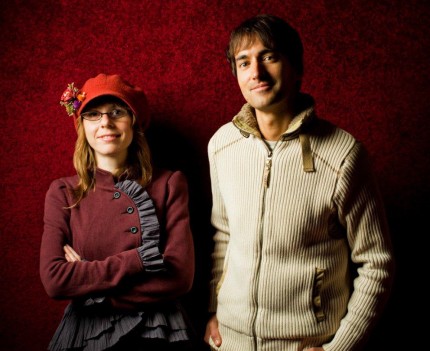MusicNow ends season on a mixed, at times piercing note

The final MusicNow concert of the season offered a pair of world premieres by the Chicago Symphony Orchestra’s composers in residence, interstitched with two other works Monday night at the Harris Theater. Perhaps the most significant element was the fact that the most individual music by far was heard in the two works written by women composers.
The evening led off with Spangled Unicorn by Anna Clyne. The CSO’s composer in residence took the fanciful title from a collection of Noel Coward poems she purchased, only to discover that there was no mention of unicorns anywhere in the collection–spangled or otherwise. Clyne asked the two young daughters of her CSO colleague Gerard McBurney to come up with their own unicorn stories, and the girls’ taped narration forms a two-minute introduction to the work.
Typical of Clyne’s music, Spangled Unicorn packs a lot into just 11 minutes. After a fanfare opening, the work segues into a swaying waltz led by CSO trumpeters Chris Martin and John Hagstrom. The music accelerates and becomes more hectic and driven with increasingly brilliant writing for trumpets set against horns and trombones. An ironic Mahler-esque dance-like theme is heard followed by some wail-like trombone cries (protests form Coward’s nonexistent unicorn?). That leads to a brief nocturnal passage for horns and another hard-driving virtuosic section with sudden full stops. The music closes with a rather low-key coda with dragging, repeated chords for trombone and tuba, like Fafner emerging from his lair.
Well-crafted, virtuosic and written with great flair and a quirky off-center humor, Spangled Unicorn is fully characteristic of Clyne’s engaging and distinctive style.
Helena McBurney, 11, and Charlotte McBurney, 9, read their brief unicorn tales with fine elocution, yet I doubt that anyone besides their parents will think the twee introduction adds anything to this work. Keep the music, lose the tape.
Though commissioned by the CSO and written for the Chicago Symphony brass, fewer than half of the musicians on stage Monday night were CSO members. That said, the ten players gave the premiere a rousing sendoff under guest conductor Pablo Heras-Casado with particularly brilliant work from Martin and Hagstrom.
Nathan Davis’s Like sweet bells jangled take its title from Ophelia’s description of Hamlet’s madness. Scored for E-flat clarinet and crotales, the work, says Davis, is concerned with space and distance: “distances between notes, sounds, ideas and physical distances between performers, audience, walls, speakers and so on.” The two players are stationed on far sides of the stage from each other with their live playing manipulated by a vintage electronic ring modulator.
Even with alert advocacy by clarinetist J. Lawrie Bloom and percussionist Cynthia Yeh, at just 7 minutes the music felt empty and interminable, with cochlea-piercing high frequencies from the distorted overamped electronics manipulated by the composer.
Yeh was featured even more prominently in the world premiere of Stereo is King by the CSO’s other composer in residence, Mason Bates. As he explains, the work exists “at the intersection of indigenous percussion sonorities and lightning-fast electronic grooves.” The leading marimba player is shadowed by bent pitches from a set of Thai gongs on a bed of foam; the antiphonal dialogue is then manipulated by stereo electronics and a third player on drums.
I’d like to be more positive about Bates’ music, but it’s becoming increasingly hard to escape the fact that, at least at this point, the young man doesn’t have a whole lot of arrows in his compositional quiver.
As in Bates’ other works in this series, the music of Stereo is King is wholly centered on amplified riffs, rhythms and little else, which doesn’t translate into distinctive pop music, much less having the heft or imagination for the concert hall. Just because music is loudly rhythmic, pop-derived, and electronic doesn’t automatically make it hip, good or even interesting when it’s performed in a traditional classical setting.
Cynthia Yeh provided astoundingly virtuosic advocacy, backed by Eric Millstein and Jacob Nissly. But I wish the talents of the CSO’s gifted principal percussionist was utilized Monday night on better music.
Happily, the concert and this season’s MusicNOW series ended on a positive note with Kaija Saariaho.
The Finnish composer is about the last person one would think of writing a violin concerto, her slow-moving, crystalline music more concerned with exploring textures and delicate sonorities than old-fashioned flashy bravura.
Yet in Saariaho’s Graal theatre from 1994—a violin concerto in all but name—she finds an artful way to balance her singular musical voice with traditional virtuosic elements.
Cast in two movements, the music has plenty of bravura fiddle writing yet it is tempered by the cool, undulating counterpoint of the chamber orchestra dominated by winds and percussion. There is often striking delicacy and Saariaho’s subtle luminous scoring is always compelling. Characteristically, Saariaho ends the piece with a fragile, child’s song-like fragment repeated in a long decrescendo by the soloist that slowly fades into silence.
Yuan-Qing Yu proved completely in synch with this music Monday night, the CSO co-assistant concertmaster’s technical polish and understated bravura giving this challenging music superb advocacy. Heras-Cassado could have drawn more refined textures at times but the chamber ensemble largely gave Yu gleaming and inspired support.
Posted in Performances




